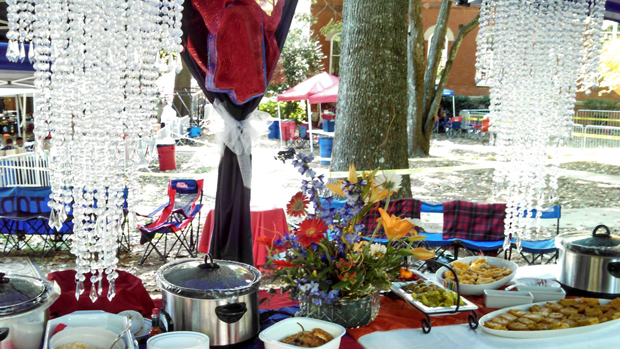
GEDSC DIGITAL CAMERA
The Grove is a place that, for many, is synonymous with tradition. But, like the campus and the town around it, there’s no denying that The Grove seems to be changing beneath our very heels and loafers.
In recent years, as the Ole Miss Football culture has gained national exposure, tailgating in The Grove has grown into a process that goes far beyond simply showing up with your tent the morning of the game. With the first football game of the season fast approaching, rumors have been swirling that the university would make changes to its policies regarding tailgating in The Grove and enforce a stricter set of game day rules.
This, according to Athletics Director Ross Bjork, is only partially true.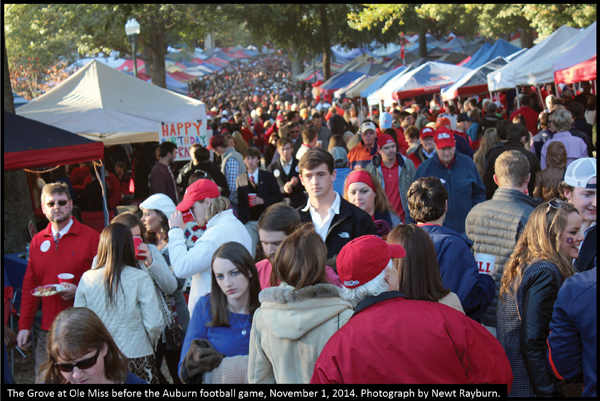
“There [are] a lot of things that have been in place before [and] just haven’t really been publicized,” said Bjork at a press conference Monday morning. “Or enforced, quite frankly.”
The most notable (and controversial) change is an adjustment of The Grove’s opening and closure each weekend. Campus will open at 7:30pm on Friday before games, and will close either three hours after the game or at midnight, whichever comes earlier. Each Friday at 6:30, The Grove will be completely cleared of both people and their personal items until the official opening an hour later.
“We’ve had record crowds in the Grove the last three seasons, and so we need to give everyone the best experience possible,” said Bjork. “We think this accomplishes that…
[T]he other thing is, people don’t have to wait and save a spot for two days.”
While safety and crowd control seem to be at the forefront of the university’s decision, not all tailgaters are exactly receptive to this perceived change.
Take, for example, Molly Beth Shaffer, a longtime Grove pro and Pride of the South alum who, in her own words, “has Groving down to a science.”
She spends entire weeks preparing unique food and beverage spreads for each game. She sets up four tents in her allotment, a spot near Ventress where the band performs pregame. She calls herself fortunate to have a job that previously allowed her to work from The Grove on Fridays while she was holding down her space. In a way, Groving is Shaffer’s second job, and she’s not entirely on board with the new workplace policies.
The old system essentially had two “runs,” one at 9am on Fridays to seek out and occupy tent spots (when Shaffer claims 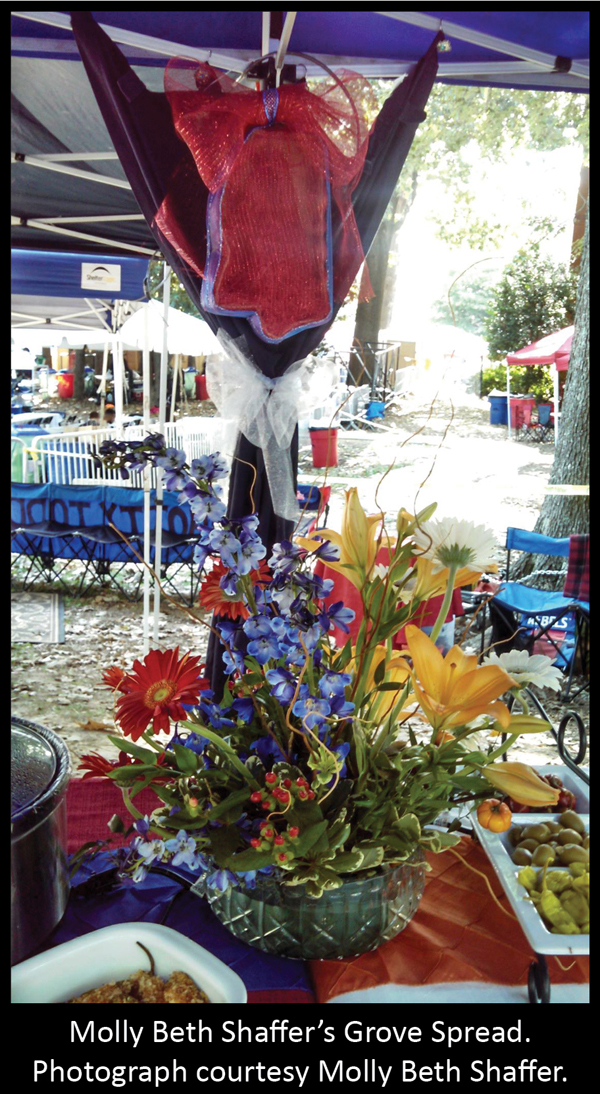 “there were never a ton of people out anyway”), then another run at 9pm to actually set up tents. This sought to discourage spot-claimers from camping out as early as Thursday night. Now, the two runs are essentially combined into one run at 7:30pm.
“there were never a ton of people out anyway”), then another run at 9pm to actually set up tents. This sought to discourage spot-claimers from camping out as early as Thursday night. Now, the two runs are essentially combined into one run at 7:30pm.
“I’m not that concerned about getting the spots,” she explains. “I am concerned that there will be some fights.”
“There’s a difference between excitement and being riled up negatively, and I don’t think there’s enough time to diffuse that more aggressive side in one hour… [I]’m not sure we have the police force to cover it.”
However, Michael Thompson, Senior Associate Athletics Director for Communications and Marketing, expects the exact opposite response from the new policy.
“When you stand in a piece of plotted grass for eleven hours without leaving, you become pretty tied to that space,” says Thompson. “We felt like, at 7:30, you’re going to be less likely to bully and defend your space if you’ve only been standing there for five or ten minutes.”
While the run will occur at the stroke of 7:30, Thompson explains that there is no tailgating equipment allowed on campus until that very minute, meaning that gear will have to be unloaded—after the spot-claiming—from a vehicle queue on University Avenue.
There is, however, one big exception to this rule: University-approved tailgating vendor services, which, according to Thompson, make up some 60% of Grove setups.
“It’s something that, ten years ago, was relatively unsophisticated,” Thompson says. “There was never really any acknowledgement that these people were operating like they were.”
“There was no program in place where we could enforce anything.”
That all changed with last year’s game against Alabama, which was highlighted by a visit from ESPN’s popular pregame show College GameDay. In the days leading up to the game, the university sowed the seeds for the current vendor policy by inviting some of the independent vendors to work together in planning for Friday’s mad dash.
“It was unbelievable the collaboration that happened in that room,” says Thompson. “Overall, it really showed me that we can work with these vendors and we should do it in a more formal way.”
This led to the creation of a “formalized, approved game day vendor program” that works with these businesses to ensure that everything runs smoothly during Friday’s setup. The program currently has over thirty approved tailgating businesses on board, each of which is required to attend two planning meetings per week to talk about the previous game’s issues and to prepare for the next game. This way, Thompson estimates that the university is able to formally communicate with “60-65% of The Grove right now.”
“These approved vendors have to follow a much stricter set of guidelines and rules than a normal customer,” he says. “It’s a minuscule amount of money that they’re paying to be part of this program—which is optional, by the way.”
Official university policies aside, Shaffer says she has noticed a disturbing trend in Grove culture in recent years regarding 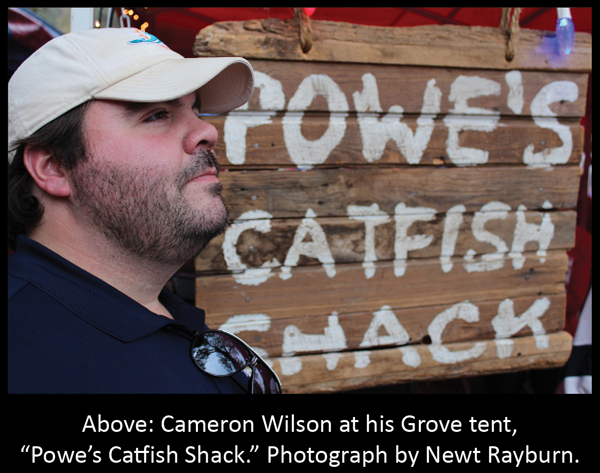 the practice of turning The Grove rush into a competition for business. Many individuals who cannot physically be present to claim a tent space will call on these vendors. This, she claims, makes Groving even more of an ordeal for locals who cannot afford such a service.
the practice of turning The Grove rush into a competition for business. Many individuals who cannot physically be present to claim a tent space will call on these vendors. This, she claims, makes Groving even more of an ordeal for locals who cannot afford such a service.
“I’ve been sitting in the grove for 12 hours every Friday for years,” says Shaffer. “[I] now have to hire at least two people to run to the spot to just hold it, and then two people to come help me haul.”
Shaffer opposes “taking care of the system [by] monetary means,” a process that she claims ensures “the person willing to pay the most gets the spot.”
“If they can’t figure out how to work this out,” Shaffer warns, “all of us who do all of the work, save our own spots, cook our own food… [w]ill be basically forcibly kicked out, and that scares me.”
“Money’s kind of the only factor that’s not subjective.”
A couple of other policies (listed in full at olemissfb.com/the-grove) have been met with hostility. However, according to Thompson, this hostility may stem from a misunderstanding of the rules’ intent.
For one, the website lists a prohibition of “amplified sound.” In reality, the aim is to cut back on volume levels (including bands and professional DJs) and lyrical content that is less than family-friendly.
“We wanted to make it clear that it’s not about having a Bose iPod dock or listening to your TV with a game on,” he explains. The rule is in place “to give UPD something as backup… [I]f we get complaints, we have an option.”
Another misleading rule is a tent size limit of 12×20 ft. One tailgater may in fact occupy a space bigger than 12×20, but must use multiple tents. Tents may not be staked down to the ground.
In regard to the shutting down of The Grove post-game, Shaffer claims that these posted rules are also misleading and that there is some leeway.
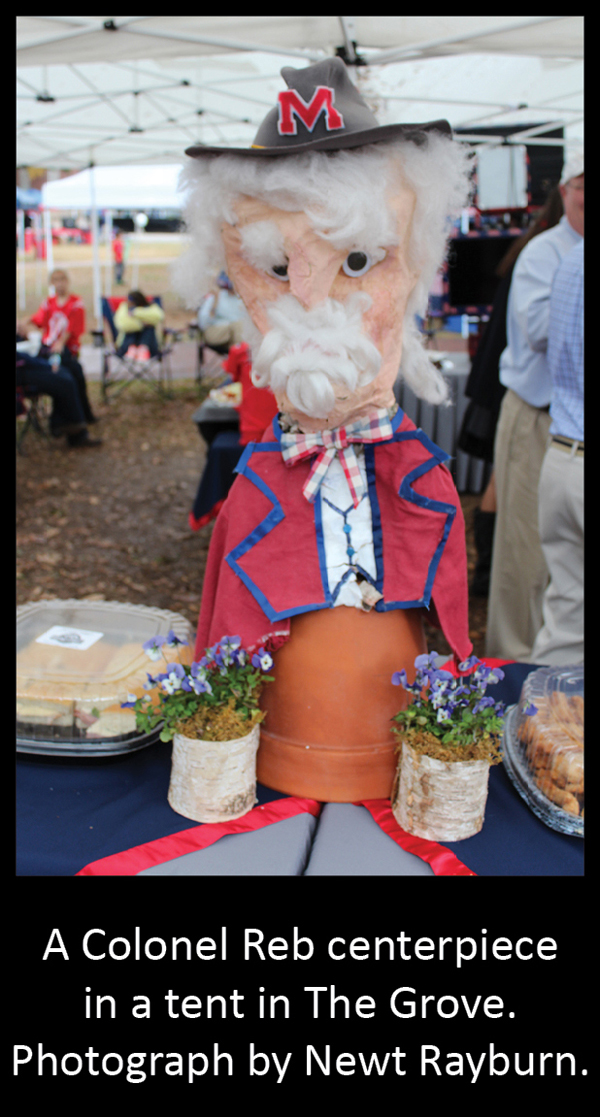 “From what I understand, they’re trying to prevent major partying from happening,” she says. When she inquired about a picnic-style dinner in the hours following the early UT-Martin game, for example, she was ensured that such activities “would not be a problem.”
“From what I understand, they’re trying to prevent major partying from happening,” she says. When she inquired about a picnic-style dinner in the hours following the early UT-Martin game, for example, she was ensured that such activities “would not be a problem.”
Overall, Thompson encourages a healthy dose of perspective in dealing with the changes in The Grove this year.
“We have the greatest tailgating venue in the world,” he argues. “That’s not hyberbole, that’s legit. People from all over the world come here.”
“There isn’t a bad space in The Grove or the circle. Not a single one. I just hope that people will remember just how special what we have is.”
Ross Bjork emphasized Monday that the new policies “really [alleviate] a lot of things that, logistically, have become challenges for our campus, for our cleaning crew, our landscape crew, and then, really, for the fans.”
“This is a university-wide decision, it’s not just Athletics,” he stressed. “[W]e’ve come together to what we think is a great game day atmosphere already, and we need to enhance it and we’ll evaluate how it works Friday and Saturday.”


